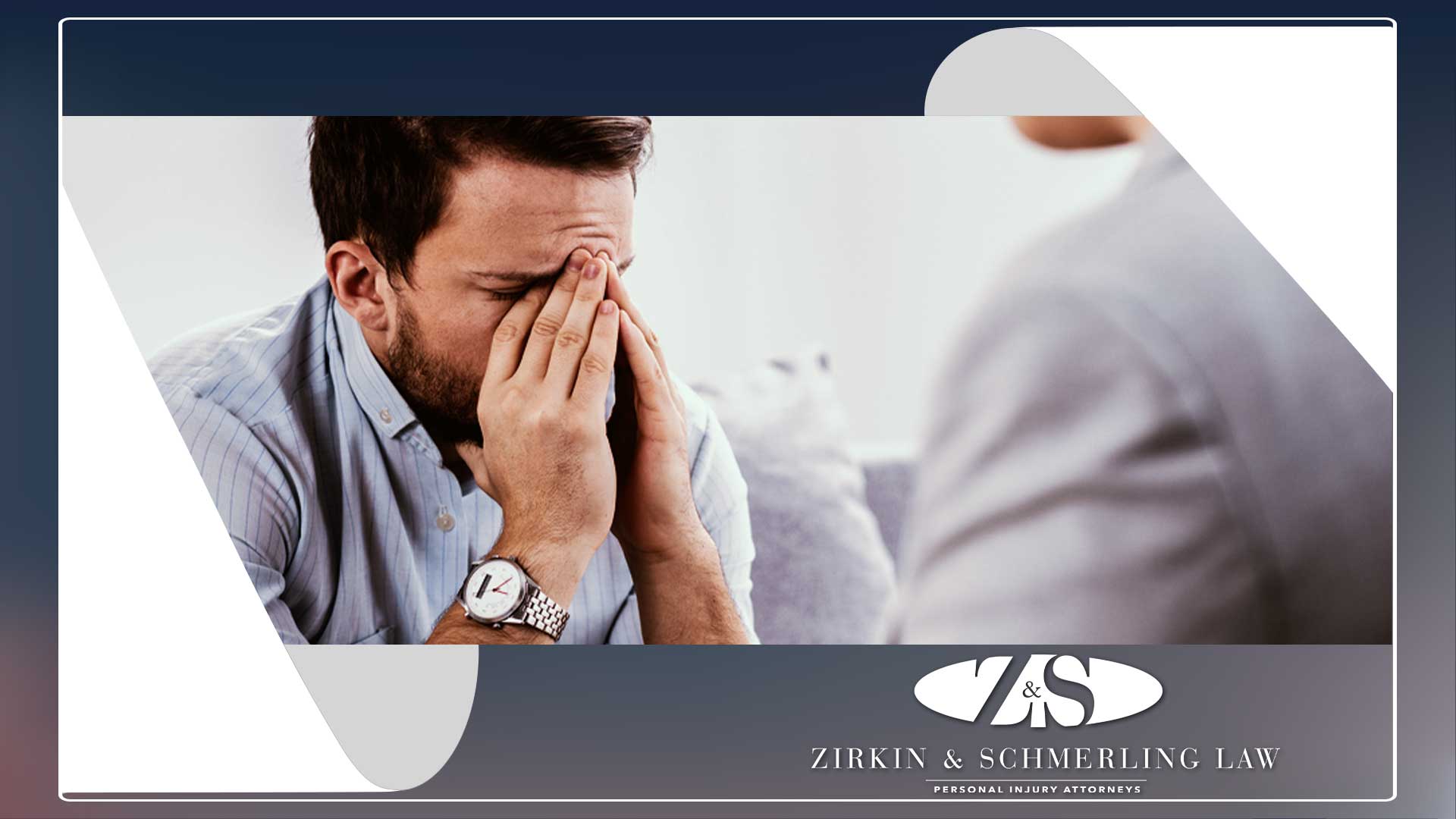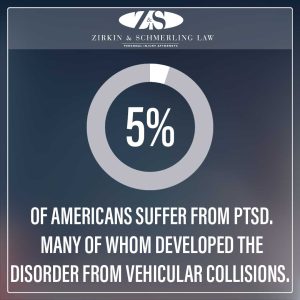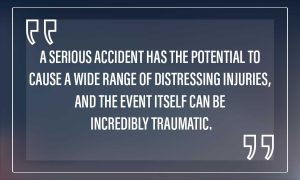
Post-traumatic stress disorder (PTSD) is a debilitating condition that affects individuals who have experienced or witnessed a distressing event. While commonly associated with military combat, PTSD can also result from any traumatic incident, including car accidents.

Tragically, millions of Americans struggle with this disorder. According to the U.S. Department of Veterans Affairs, around 5% of Americans suffer from PTSD, and around 13 million struggled with the condition in 2020 alone, many of whom developed the disorder from vehicular collisions.
If you’re struggling with PTSD from a car accident, it’s crucial that you seek damages for your mental and emotional pain and suffering. Here at Zirkin & Schmerling Law, we assist car accident victims in Maryland, and we can fight on your behalf to ensure you recover the full compensation you deserve for this condition.
In this blog, we delve into the intricacies of PTSD, including its symptoms and treatment, and how you can recover damages.
Can Car Accidents Cause PTSD?

A serious accident has the potential to cause a wide range of distressing injuries, and the event itself can be incredibly traumatic. A sudden and loud collision can instill fear and anxiety, and the physical injuries resulting from an accident may further contribute to psychological trauma.
These often-terrifying and distressing events can deeply impact a person’s mental and emotional health and cause them to develop post-traumatic stress disorder. This can take the form of distressing flashbacks, where the car accident victim vividly re-experiences the event as if it is happening again.
Motorcycle accident victims may be especially vulnerable to developing post-traumatic stress disorder because they lack the same bodily protection as standard passenger cars. A biker is more exposed to the elements and has a higher risk of sustaining severe injuries and experiencing traumatic events, such as being thrown from their motorcycle.
What are the Symptoms of PTSD?
Those suffering from PTSD after a car accident or another type of crash may develop debilitating symptoms. These may become apparent within a month of the accident, but many who develop PTSD don’t suffer from the disorder until long after the traumatic event.
Post-traumatic stress disorder symptoms include:
- Intrusive memories: Distressing and unwanted memories of the traumatic event, often experienced as flashbacks or nightmares.
- Avoidance: Avoiding people, places, activities, or conversations that remind the individual of the traumatic event.
- Negative thoughts and mood: Persistent negative beliefs as well as feelings of guilt, shame, or fear. Loss of interest in previously enjoyed activities is also common.
- Emotional reactivity: Experiencing intense emotional reactions, such as anger, irritability, or emotional outbursts, often disproportionate to the current situation.
- Sleep disturbances: Difficulty falling asleep, staying asleep, or experiencing nightmares related to the traumatic event.
- Social withdrawal and isolation: Avoiding social interactions and withdrawing from friends, family, or social activities.
- Physical symptoms: Headaches, gastrointestinal problems, rapid heartbeat, or unexplained aches and pains.
- Hypervigilance: Constantly scanning the environment for potential threats, feeling on guard, and having difficulty relaxing.
- Memory and concentration difficulties: Struggling to remember details of the traumatic event or having difficulty concentrating on tasks.
I Have PTSD From a Car Accident. What Should I Do?
If you’re suffering from PTSD symptoms, you need to seek medical assistance from a qualified healthcare professional, such as a psychiatrist or psychologist, to diagnose your condition and prescribe treatment.
Your healthcare professional will likely diagnose your condition by using the Diagnostic and Statistical Manual of Mental Disorders (DSM-5).
Treatment for PTSD often includes a combination of psychotherapy and medications. Psychotherapy, such as cognitive-behavioral therapy (CBT), exposure therapy, and eye movement desensitization and reprocessing (EMDR), helps individuals process the traumatic event, manage distressing symptoms, and develop healthy coping mechanisms.
Your healthcare professional may also prescribe medications, such as antidepressants or anti-anxiety medications, to alleviate your specific symptoms.
Not only is receiving an official diagnosis and subsequent treatment critical for your mental and emotional health — but it will also increase your likelihood of recovering fair compensation.
Proving You Have PTSD
To recover compensation after a car accident, you need to be able to provide ample evidence that the other driver was at fault and that the collision directly caused you to suffer losses. To prove you have PTSD, you’ll need to have an official diagnosis from a qualified healthcare professional.
Other forms of evidence include:
- All medical documentation relating to your PTSD, including doctors’ notes, diagnostic evaluations, therapy session notes, and prescriptions
- A personal journal that records your PTSD symptoms and how it impacts your life
- Eyewitness statements corroborating that you experienced visible fear at the time of the accident
- Testimony from friends, co-workers, and family members attesting that the collision has impacted you mentally and emotionally
How Much Compensation for PTSD After a Car Accident
The amount of compensation you can expect to recover from your accident will depend on your specific losses. Depending on your unique case, you may be able to recover compensation for vehicle damage, medical bills, loss of future earnings, lost wages, and pain and suffering.
Post-traumatic stress disorder falls under the category of pain and suffering, but you may also be able to recover compensation for your PTSD treatment and any money you lost due to your condition. This serious disorder may disable you from working and earning a living wage.
You should also seek damages to compensate you for any other injuries that resulted from your crash, including fractures, lacerations, internal injuries, whiplash, and head trauma.
What is the Average Payout for PTSD?
Unfortunately, it’s impossible to quantify the exact average settlement for PTSD from a car accident because it depends on a wide variety of factors. Those who receive pain and suffering damages typically recover compensation for other losses as well.
The amount of compensation you can expect to recover will depend on the severity of your condition, proof for your claim, and how the disorder has impacted your life.
Contact a PTSD Car Accident Attorney in Maryland
To recover the full compensation you deserve after developing PTSD, you’ll need to consult with an experienced personal injury attorney who can evaluate the specific details of your case, gather necessary evidence, and negotiate the claim on your behalf.
For expert PTSD car accident attorneys in Maryland, contact Zirkin & Schmerling Personal Injury Attorneys. You can schedule your free consultation today by calling 410-753-4611 or by filling out our consultation form online here.
